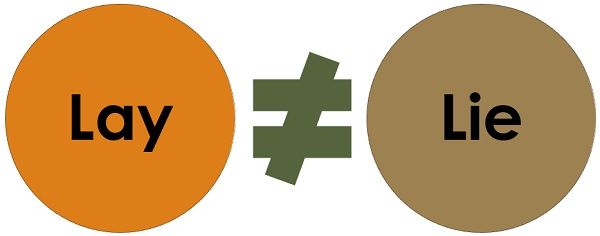 Lay and Lie are such a pair of words, which are not only spelt differently but their pronunciation is also different. Still, they cause confusion in people due to some similarity in their meanings. Lay is used to put something down in a horizontal position.
Lay and Lie are such a pair of words, which are not only spelt differently but their pronunciation is also different. Still, they cause confusion in people due to some similarity in their meanings. Lay is used to put something down in a horizontal position.
On the contrary, Lie is used to put oneself in a horizontal position. It has one more meaning, i.e. to make an untrue statement. Let ‘s take a look at the examples to understand the differences:
- Sunny laid the phone on the table and lie on the couch.
In the given example laid (simple past form of the verb ‘lay’) is used to mean that the phone is placed on the table. On the other hand, lay (simple past form of the verb ‘lie’) which means that the subject reclines on the couch.
Content: Lay Vs Lie
Comparison Chart
| Basis for Comparison | Lay | Lie |
|---|---|---|
| Meaning | Lay basically means to put or place a person/object down in an even position. | Lie means to recline or to rest on a surface, with back supported. |
| Pronunciation | leɪ | lʌɪ |
| Verb | Transitive Verb | Intransitive Verb |
| Action | You put an inanimate object down. | You do it yourself. |
| Indicates | An action in progress. | A person's position. |
| Examples | She laid the books on the top shelf. | All the friends are lying on bed and playing cards. |
| Priya laid the glasses on the tray. | Kate lie on her mother's lap. |
Definition of Lay
In general, we use the word ‘lay’ to place an object in an even position, i.e. to arrange something over a plane horizontally. Nevertheless, it has a variety of meanings, which depends on the context we are using it. So, let’s take a look at how can we use them in our sentence:
- To set something in flat position:
- She laid the files on the desk.
- I laid my head on my mother’s shoulder and slept for an hour.
- To produce eggs:
- Hen lay eggs.
- To risk something, usually as bet:
- He will not be selected in IIT – I would lay thousands on it.
- To make a plan:
- There is hardly any plan executed exactly in the way; we laid it.
- To express a claim, blame or accuse someone in a formal manner:
- Are you aware of the allegations laid on you?
Definition of Lie
The word lie is used to refer to be or to move in a reclining or resting position on a surface, i.e. bed, sofa, floor, or any other object. It is an intransitive verb, as it does not takes any object. Now, let’s take a look at the points below to understand its uses:
- To remain in a flat or resting position or move into one:
- Piya is lying on the sofa since morning.
- After the event, I came to my room and lay on the bed, because I was too tired to do anything.
- To indicate that something is placed in a particular place or it is in that direction:
- The city lies on the bank of Yamuna river.
- To tell an untrue statement to mislead someone:
- Jill lied to me regarding the incident.
- Is she lying to me?
Key Differences Between Lay and Lie
The difference between lay and lie are given in the points below:
- Lay means to put a person or an object down in a flat position. On the other hand, lie means to remain or to move oneself in a resting or reclining position on a surface, i.e. at your own.
- The verb lay is a transitive verb, and so there is a direct object following it. On the other hand, the word ‘lie’ is an intransitive verb, and so it does not have any direct object.
- When we are using lay in our sentence, it means that we are putting down an inanimate object. As against, when we are using lie, you are doing it on your own. For Example, Shael laid the spectacles in its case and lay on the sofa.
- While lay represents an action which is under progress, lie talks about the position of a person, which is either reclining or changes into reclining position.
Verb Forms
| Base form | Simple Past | Past Participle | 3rd Person Singular | Present Participle |
|---|---|---|---|---|
| Lay | Laid | Laid | Lays | Laying |
| Lie (to recline) | Lay | Lain | Lies | Lying |
| Lie (to deceive) | Lied | Lied | Lies | Lying |
Examples
Lay
- The mother laid the baby in the cradle.
- After laying the clothes into the almirah, Alia went shopping.
- As her brother was injured, she helped him to lay down on the sofa.
Lie
- I lay on the sofa to watch TV.
- As she was very tired, she lay on the bed and slept immediately.
- When I am ill, I lie on my bed.
How to remember the difference
The primary reason for the confusion between lay and lie is because the simple past tense form of lie is lay, as given in the table. To eliminate this confusion you need to memorise these verb forms by heart as well as you have to identify the object, i.e. if it contains a direct object, use lay, if it doesn’t, use lie.






Leave a Reply